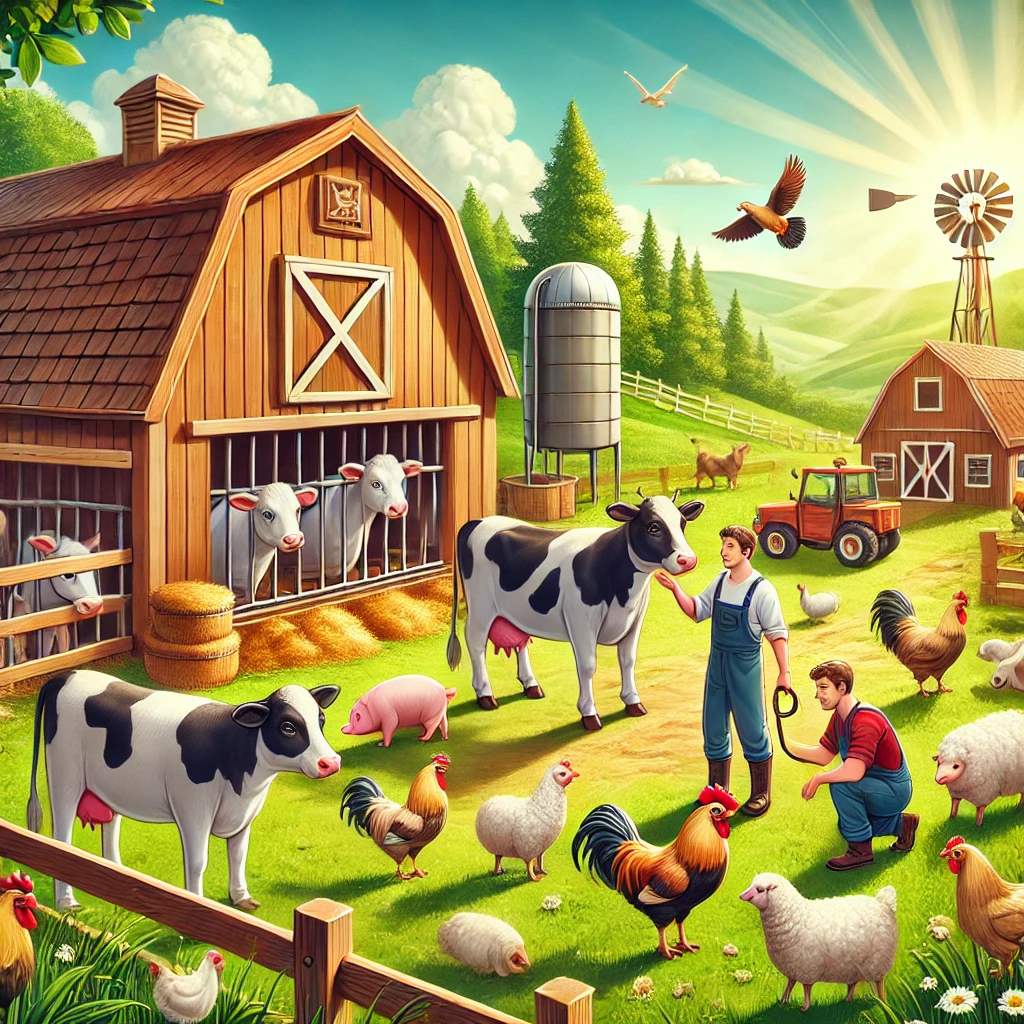
Farm Animal Care
Caring for farm animals is a rewarding yet demanding responsibility. Whether you’re raising cattle, chickens, goats, or horses, ensuring their well-being is essential for their health, productivity, and overall happiness. Proper farm animal care includes providing balanced nutrition, clean living conditions, regular health check-ups, and plenty of love and attention.
In this guide, we’ll explore the best practices to keep your farm animals healthy, comfortable, and thriving.
1. Providing Proper Nutrition
Good nutrition is the foundation of farm animal care. Each type of livestock has unique dietary needs, and providing the right food ensures their growth, productivity, and immunity.
✔ Balanced Diet for Different Farm Animals
🐄 Cattle: High-quality hay, grains, and fresh water are essential. Consider mineral supplements for better health.
🐖 Pigs: Pigs need a diet rich in protein, fiber, and vitamins. Avoid feeding them excessive table scraps.
🐔 Chickens: A mix of grains, protein, and calcium (like crushed eggshells) keeps them healthy and improves egg production.
🐑 Sheep & Goats: They thrive on pasture grass, hay, and mineral blocks for essential nutrients.
✔ Hydration is Key: Always provide fresh, clean water to prevent dehydration and illnesses.
2. Creating a Clean & Safe Living Environment
A well-maintained shelter is crucial for the well-being of farm animals. Proper housing protects them from harsh weather, predators, and diseases.
✔ Key Elements of Good Shelter
✅ Ventilation: Ensure proper airflow to prevent respiratory illnesses.
✅ Dry & Comfortable Bedding: Use straw, sawdust, or sand to keep animals warm and dry.
✅ Protection from Predators: Secure fencing and enclosed coops help keep animals safe.
✔ Waste Management
Regular cleaning of barns, coops, and pens helps prevent the spread of diseases and keeps the farm environment healthy.
3. Farm Animal Health Care: Prevention & Treatment
Keeping farm animals healthy requires routine check-ups, vaccinations, and parasite control.
✔ Regular Health Checks
👩⚕️ Observe animals daily for signs of illness such as lethargy, weight loss, unusual behavior, or loss of appetite.
💉 Follow a vaccination schedule to prevent diseases like foot-and-mouth disease, avian flu, and pneumonia.
🦟 Use deworming treatments and pest control to protect animals from ticks, lice, and worms.
If an animal shows signs of illness, consult a veterinarian immediately to prevent the condition from worsening.
4. Exercise & Socialization for Happy Farm Animals
Animals, just like humans, need movement and companionship to stay happy and stress-free.
✔ Encouraging Natural Behaviors
🐎 Horses: Regular exercise, grooming, and social interactions are essential.
🐄 Cattle & Sheep: Provide open grazing areas to keep them active.
🐖 Pigs: Allow them to roam and explore, as they are naturally curious animals.
🐔 Chickens: Free-range setups let them scratch, peck, and forage naturally.
A happy animal is a healthy animal, so ensure they have enough space to move freely and interact with others.
5. Reproduction & Breeding Management
If you plan to breed farm animals, understanding the reproductive needs of each species is important.
✔ Breeding Best Practices
🐄 Cattle & Sheep: Monitor their heat cycles and provide proper nutrition for pregnant females.
🐖 Pigs: Ensure a clean and stress-free environment for pregnant sows.
🐔 Chickens: Allow hens a comfortable nesting area if you want them to hatch eggs.
Providing proper prenatal care ensures healthy offspring and reduces birthing complications.
6. Ethical & Sustainable Farm Animal Care
Sustainability and ethics are becoming increasingly important in modern farming. Treating animals with respect and ensuring their well-being not only benefits them but also improves farm productivity.
✔ Tips for Ethical Farming
🌱 Avoid Overcrowding: Give animals enough space to move freely.
🐾 Use Humane Handling Practices: Avoid rough handling and stress-inducing practices.
🌍 Sustainable Feeding: Grow your own feed when possible and minimize food waste.
By practicing humane and ethical farm animal care, you contribute to a healthier and more sustainable farming future.
Caring for farm animals requires dedication, patience, and knowledge. From proper nutrition to routine health checks, every aspect of farm animal care plays a role in keeping your animals happy and productive. Whether you’re a small-scale farmer or managing a large livestock operation, showing love and care to your animals will always pay off.
🐮🐷🐔🐴 Do you have farm animals? Share your best farm animal care tips in the comments below!
